Many sponsors have the misconception that Compassion runs schools. We do not. However, we do facilitate a holistic child development program that complements and supplements the school systems in the countries we works in.
My country’s (Kenya) education system has been heavily influenced by the British system. Students have eight years of primary school, four years of high school, and four years in an undergraduate program at a university.
It is a requirement for all Compassion-assisted children, regardless of country, to attend the normal school system while they participate in activities at their child development centers. In Kenya, the Compassion programs are most commonly conducted on Saturdays. Because public schoool runs Monday through Friday, the children are easily available for the center activities.
The purpose of our Christian child sponsorship program is to help children to become “responsible and fulfilled Christian adults.” Our Implementing Church Partners (ICPs) are encouraged to be creative in the ways they administer the program, but we also provide age-graded curriculum to help each church partner minister to their children consistently.
The age-graded curriculum is based on the outcomes we hope to see in children in the four facets of development: spiritual, physical, cognitive and socio-emotional.

The spiritual domain of the activities at child development centers includes praise and worship, testimonies from children, various presentations such as memory verses, short sermons, and prayers. The implementers ensure that children are actively involved and are exhibiting understanding of the Bible and the essence of prayer and service. During special occasions, the implementers invite outside facilitators.
Our public school system has designated days for pastoral programs. Certain teachers or the school chaplain take the students through devotion that lasts for about half an hour. Each student attends devotion, depending on his or her faith.
In our sponsorship program, the physical well-being of the children is addressed through various activities depending on the resources available at the development center. Soccer is a popular sport for boys, while volleyball and netball are popular with girls. Some church partners have swings, table tennis and board games that engage the kids during breaks.
In the physical realm, the most significant difference from the schooling system is that we provide medical intervention for the sponsored children. The health of the child is monitored on a regular basis through health screenings. Public schools tend to offer first-aid intervention, while the parent/guardian takes care of any other expenses incurred at the local health facility.
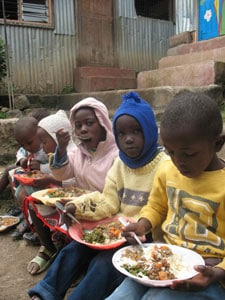
In addition, public schools rarely offer nutritional supplements to children with deficiencies. We, on the other hand, provide nutrition education as well as nutritious food during program days.
Social-emotional interaction is paramount for the well-being of every child, especially children growing up in dangerous environments. Compassion-assisted children are given opportunities to interact in a more meaningful way than in a school. The activities provided are a fertile ground for enhancing one’s self-esteem and dignity.
Our children are encouraged to interact from a biblical perspective, and high standards of morality are advocated. The curriculum taught at the development centers lays a good foundation for self-awareness and reflection. It helps the children to recognize their own strengths and weaknesses and how to best cultivate their God-given gifts.
The concept of stewardship is taught, helping them to be aware of their responsibility to the community. Vocational Bible studies, youth camps and seminars, drama clubs, and other creative arts, picnics, and inter-partner competitions offer opportunities to practice what they have learned.
Our goal of leading children along the path of economic independence compels implementers to help children complete the various stages of education. The unfortunate thing about public school systems is the difficulty of trying to update the curriculum to fit emerging trends. Much of the material is very dated and not relevant to children’s daily challenges.
Our curriculum is customized and targeted to the children in their various environments. In case the child does not continue to secondary education, vocational skills are available both at the development center and in a few institutions that can help the child become economically self- supporting. The young people learn income-generating activities, such as soap making, mat weaving, tailoring, cookery and beadwork.
Community service helps children experience the joy of giving back. The young ones in the sponsorship program are encouraged to engage in community cleanups on designated days. More often than not, they help clean the church premises for Sunday services. They also clean their own classrooms, and plant and water flowers and trees within the church compound. Older kids sometimes visit the sick and elderly in the hospital to pray for and encourage them.
Public school systems generally don’t provide for such opportunities, as the main focus is academics. The children also receive more attention at their development centers, as the teacher-student ratio in Kenya’s public schools can be as high as 1 to 80.
Compassion also offers holiday programs to the children. The usual school holidays in Kenya take place in April, August and December. The monthlong breaks separate the school terms, providing opportunities for children to rest and spend time with their families.
However, the competitiveness of the schooling system has forced many schools to conduct holiday sessions that offer specialized training. The schools then continue with the normal curriculum and children have to pay an extra admission fee, exam fee and catering fee.
During this same time, the majority of Compassion Kenya’s child development centers conduct remedial classes for their children for free. Holiday sessions at the development centers continue to supplement what takes place in school. An added advantage is the provision of textbooks and an environment in which to study.
Normally, remedial classes last about two weeks of the holiday. Part-time teachers collaborate with the child development workers to help students, especially those in upper primary school and candidates waiting to take their exams. Over and above class work, these students are engaged in the normal Saturday program activities and are provided with nutritious meals during the day.
During normal school days, many children attend the development center in the evenings for group learning and review. With the help of part-time teachers, they review past papers to test their knowledge and become familiar with the most critical topics.
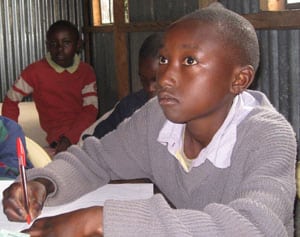
Most children we serve attend government schools; however, some of our church partners do run their own schools. These schools are not affiliated with Compassion, but are the property of the church partners. In these circumstances, we run our own program parallel to what takes place in the school. This way, the children benefit from both the school activities as well as the sponsorship program.
In these situations, most of the Compassion-assisted children usually attend the church school. It is important for the school and the sponsorship program to work together to maximize instruction.
While the school program incorporates both the Compassion-assisted and non-assisted children and focuses mainly on academics, the sponsorship program concentrates on holistic child development.
School activities are usually funded primarily through school fees paid by individual pupils through their guardians and other donors. On the contrary, our sponsorship program depends largely on donor funding and minimal contributions from parents.
In the event a child’s parent is unable to sustain a school fee payment, the child no longer benefits from the program offered by the school. But our program continues to offer services to the assisted children and their families without attaching monetary requirements to it.
While typical school systems in the developed world don’t serve children’s non-academic needs, we not only address the academic but also the socio-emotional and physical, and most important, we bring the children the knowledge of Jesus Christ.
Our model focuses on the child’s here and now, as well as the future. This perspective is different from most schools. Schooling systems do a great job of engaging children and molding their way of thinking, preparing them for the “world out there,” but we prepare children to deal with their daily struggles, as well as focus on the envisioned future.
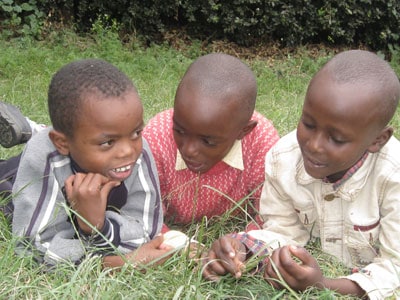


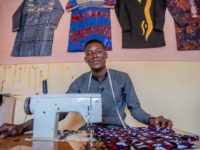

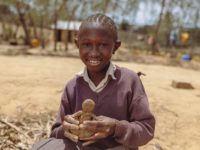


21 Comments |Add a comment
Thank you for posting this. My child attends the Makiba Anglican st Centre in Tanzania. The progress report I received lists Makiba Primary School. Are her marks from a government sponsored school or are they from the center? I am wondering how far the children travel to reach the centers. My litle one has not provided much information yet about these things although she says she enjoys learning at the center. Thanks.
Donna, if you’ll give us a call at (800) 336-7676, we’d be happy to answer these questions. Without looking at your sponsored child’s specific information, it is hard to give a definite answer.
Most informative. I had some misconceptions until now. Thank you.
What sponsorships do you provide in the United States?
If you mean what opportunities to do you have to support Compassion through sponsorship as someone who lives in the United States, this website is a good information tool about how you can support Compassion’s work through their multiple sponsorship options: https://www.compassionmodel.org/
If you mean what sponsorships does Compassion provide to United States children, Compassion does not provide sponsorships for children in the United States. However, I would argue that if you get children here involved in writing letters and building a relationship with a child living in extreme poverty, then that child in the United States is richly blessed. Compassion is one organization that works on a global level to fight extreme poverty. There are many excellent organizations inside the United States that work to raise up a next generation of leaders and provide support for those children who need more than they currently receive. I feel where I send my money and give my time has to do with the passion God gave me for a given cause, which for me is both locally and globally.
This is really helpful as am able to understand Compassion Programmes deeper. I now realise that Compassion does not replace schools but provides the best support that can enhance child participation, protection and build their self esteem.
Something I’ve read about on the Children International blog and in other places is the toxic effects of the environments that our children live in, contaminated by heavy metals, e-waste, unhealthy water supplies, inadequate sanitation and so forth. Just this week I prayed a one-off petition that my children would be healed from the effects of such contamination on both their physical and their mental health, in the way of learning difficulties/disabilities, developmental disorders, memory loss, behavioral problems as well as physical sickness. To what extent does Compassion ameliorate these problems where they exist, and what environmental standards does Compassion impose to prevent the centers from becoming toxic environments?
Paul,
I shared your comment with some folks in our International Program Group, and Bob Thorp, our Complementary Interventions Technical Solutions Manager, sent me this reply.
Thank you for explaining this to me. I’m grateful to hear that Compassion is doing what it can, even if that isn’t always a perfect solution to every risk. I will keep praying for the children!
how does it work with the kids in the Asian countries that live away from home for part of the year. I have a girl in India that lives in a ‘Girl’s Home’ for part of the year, and then with her parents the rest of the year. Does Compassion have a school right there, or do they go to a neighborhood school?
Most likely your child attends a government run or church run school in her area, since we don’t run schools. However, we do have child development centers throughout the country. It’s possible that she attends one child development center when she is with her parents and another when she isn’t with them. Or she could just attend a center at one of the locations. There might even be other options that I’m not familiar with. You might want to call our contact center and ask. The representative can ask our India office to get an answer for you. You could also ask your child in your next letter, even if you already know the answer. 🙂
I went to a concert and took one of the cards to sponser a child, but before I could start my payments, my job withheld all of their employees checks for 6 weeks, and then I was fired and lost my apartment. While packing up I missplaced my card with my child, and I would like to know if you could help me find out who he was and how I can be reunited as his sponser, I will be reseiving un employment until I find a job, so I would be much apreciative if you could help me find my little boy whom I was very happy to be sponserring. I did not even get to send in one payment for him…
If you didn’t send a payment, then I don’t believe Compassion has any way to determine who the particular child is that you picked. It’s only when they receive your payment that you become that child’s official sponsor. Those packets expire after a week or so’s time and then that child goes back into the system and is available to be sponsored by someone else. If you remember any information about him, you could always call Compassion and ask if he’s still available. Otherwise, you could always pick a new child to sponsor.
Silas, thank you for explaining this in such detail! It really helps me understand more about our Compassion kids in Kenya. We love our LDP in Kakamega, too! 😉
Thank you Sherry, I am glad the post helped you understand the program better. Please keep praying for your student. IT WORKS! 🙂
Thank you for this information! I thought you ran the centers also. I have a child in Kenya so this post was very interesting!
Thanks again!
Thank you so much!
Do the unsponsored children receive the same benefits as the sponsored children in the project? I’m still unclear on what advantages sponsored children have over the unsponsored, other than receiving gifts and letters.
Once a child is registered in our sponsorship program the child begins receiving all the tangible benefits of our program without the relationship with a sponsor, without the gifts and letters.
We’re able to provide the program benefits to the unsponsored children through our Unsponsored Children’s Fund. The Unsponsored Children’s Fund bridges the gap between registration and sponsorship.
Thanks for answering my question. It’s good to know that all the children can benefit!
This was such a good blog! It really helped me understand how the project centers function and what they add. Thanks for sharing this with us!